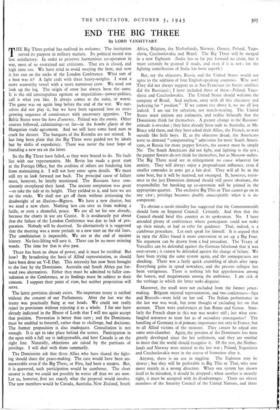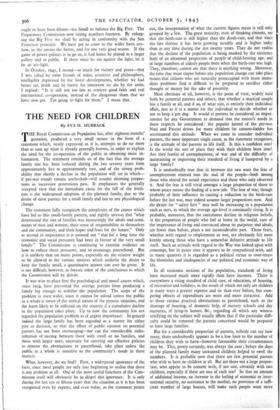END THE BIG THREE
By LORD VANSITTART
THE Big Three period has outlived its welcome. The institution served its purpose in military matters. Its political record was less satisfactory. In order to preserve harmonious co-operation in war, most of us restrained our criticisms. That era is closed, and high time too. We have tried to avoid swaying the boat, and now it has run on the rocks of the London Conference. What sort of a boat was it? A light craft with three heavy-weights. I want a more seaworthy vessel with a more numerous crew. We need not look up the log. The origin of error has always been the same. It is the old unscrupulous egotism or imperialism—power-politics, call it what you like. It always comes to the same, or worse. The game was on again long before the end of the war. We our- selves did not play it, but we have been squeezed into an ever- growing sequence of connivances with unsavoury appetites. The Baltic States were the hors d'oeuvres. Poland was the entrée. Other courses followed, culminating—so far—in the bombe glacie of the Hungarian trade agreement. And we still have some hard nuts to crack for dessert. The banquets of the Kremlin are not stinted. It has long been plain that the Big Three were guided not by ideals but by shifts of expediency. There was never the least hope of founding a new era on the latter.
So the Big Three have failed, as they were bound to do. No fault lies with our representative. Mr. Bevin has made a great start at the Foreign Office, but the avidities of others are hindering him from maintaining it. I will not here enter upon details. We must still try to look forward not back. The principal cause of failure must, however, be briefly mentioned. The Russians have con- sistently overplayed their hand. The ancient temptation was great —to take the tide at its height. They yielded to it, and here we are on the rocks. We shall not get off them without jettisoning the deadweight of an illusion—Bigness. We have a new charter, but we need a new chart. Nothing less can save us from making a futile, or even a shameful, peace. We are all set for one already, because the charts in use are Czarist. It is assiduously put about that the failure of the London Conference was due to lack of pre- paration. Nobody will be deceived. So alternatively it is suggested that the meeting was a mere prelude to a new start on the old lines. The combination is impossible. We are at the end of ancient history. No face-lifting will save it. There can be no more mincing words. The time for that is also past.
There has been an abuse of power, and it must be rectified. But how? By broadening the basis of Allied representation, as should have been done on V-E Day. This necessity has now been brought to the fore by the Dominions. Australia and South Africa put for- ward two alternatives. Either they must be admitted to fuller con- sultation at the Conference, or its findings must be subject to their consent. I support their point of view, but neither proposition will serve.
The latter provision already exists. No important treaty is ratified without the consent of our Parliaments. After the last war the treaty was practically flung at our heads. We could not really reject its provisions without rejecting it as a whole. I for one have already indicated in the House of Lords that I will not again accept that position. Prevention is better than cure ; and the Dominions must be enabled to forestall, rather than to challenge, bad decisions. The former proposition is also inadequate. Consultation is not enough. It is apt to take place behind the scenes. Participation in the open with a full say is indispensable, and here Canada is on the right line. Naturally, objections are raised by the partisans of privilege. I will deal with them summarily.
The Dominions ask that those Allies who have shared the fight- ing should share the peace-making. The case would have been un- answerable even if the Big Three, or Five, had been a success. But, it is quavered, such participation would be cumbrous. The short answer is that we could not possibly be worse off than we are now. Let us, however, first see exactly what the proposal would involve. The new members would be Canada, Australia, New Zealand, South Africa, Belgium, the Netherlands, Norway, Greece, Poland, Yugo- slavia, Czechoslovakia and Brazil. The Big Three will be merged in a new Eighteen. (India has so far put forward no claim, but it must certainly be granted if made, and even if it is not ; for the fighting contribution of India has been superb) But, say the objectors, Russia and the United States would not agree to the addition of four English-speaking countries. Why not? They did not always support us at San Francisco (as Soviet satellites did the Russians) ; I have included three of these—Poland, Yugo- slavia and Czechoslovakia. The United States should welcome the company of Brazil. And anyhow, away with all this chicanery and jockeying for " position." If we cannot rise above it, we are all lost indeed. I am out for salvation, not march-stealing. The United States must jettison any jealousies, and realise belatedly that the Dominions think for themselves. A greater change in the Russians' attitude is overdue ; they have already been rude to Australia, as Mr. Bruce told them, and they have asked their Allies, the French, to wait outside like little boys. If, as the objectors dread, the Americans were to demand " compensating " admission for more South Ameri- cans, or Russia for more puppet Soviets, the answer must be simply No. The South Americans did not fight, and fighting is the test ; the puppet Soviets do not think for themselves, but as Moscow orders. The Big Three need see in enlargement no cause whatever for anxiety. They will always enjoy a preponderant influence, even if smaller comrades in arms get a fair deal. They will all be in the same boat, but it will be manned, not swamped. If, however, resist- ance to the just Dominion demand should still prove obstinate, the responsibility for breaking up co-operation will be pinned in the appropriate quarter. The exclusive Big This or That cannot go on in any case ; privilege becomes doubly unacceptable when it is in- competent.
To obviate a tussle timidity has suggested that the Commonwealth should form an Imperial Council. Certainly. And then that the Council should brief this country as its spokesman. No. I have attended plenty of conferences where participants could not make up their minds, or had to refer for guidance. That, indeed, is a cumbrous procedure. Let each speak for himself. It is argued that in 1919 the Allies found it more convenient to set up a Big Four. No argument can be drawn from a bad precedent. The Treaty of Versailles can be defended against the German falsehood that it was over-severe ; it cannot be defended against the charge of failure. We have been trying the same system again, and the consequences are shocking. There was a fairly quick crumbling of ideals after 1919. Everything gains in speed nowadays, and the present collapse has been vertiginous. There is nothing left but apprehension among the honest, and megalomania among the ambitious. I am sick of the verbiage in which the latter seeks disguise.
Moreover, the small were not excluded from the former peace- making. Belgium enjoyed representation, and two conferences—Spa and Brussels—were held on her soil. The Italian performance in the last war was weak, but none thought of excluding her on that account. There were conferences at San Remo and Genoa. Simi- larly the French share in this war was weaker still ; but what new- fangled nonsense to treat her as of secondary consequence ! The handling of Germany is of primary importance not only to France, but to all Allied victims of the monster. They cannot be edged into some ante-chamber. Again, the position of the Dominions has been greatly developed since the last settlement, and they are entitled to insist that the world should recognise it. Of the rest, the Nether- lands and Norway were neutral in the last war ; Poland, Yugoslavia and Czechoslovakia were in the course of formation after it.
Anyway, there is no use in niggling. The Eighteen may be slower ; but they will be preferable to Big This or That, who now move mainly in a wrong direction. When one system has shown itself to be mistaken, it should be dropped ; when another is morally right, it must be accepted with its disadvantages. There are eleven members of the Security Council of the United Nations, and there
ought to have been fifteen—ten Small to balance the Big Five. The Preparatory Commission now sitting numbers fourteen. By enlarg- ing the Big Five we shall be acting in conformity with the San Francisco principle. We have got to come to the wider basis any- how, -so•the sooner the better, and for one very good reason. If the game of power-politics is to go on, it had better be played to a larger gallery and in public. If there must be sin against the light, let it be an arc-light.
In October, 1945, I record—so much for victory and peace—that I was asked by some friends of mine, scientists and philosophers, intelligibly depressed by the latest developments, whether we had better eat, drink and be merry for tomorrow we die by the atom. I replied : " It is still not too late to retrieve good faith and real international co-operation, instead of the dangerous sham that we have now got. I'm going to fight for them." I mean that.



























 Previous page
Previous page